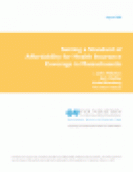2012 Massachusetts Health Reform Survey
Affordability Gap Remains Despite Coverage Gains
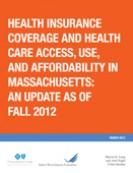

Affordability Gap Remains Despite Coverage Gains


This chartpack summarizes the impact of the 2006 Massachusetts health reform law. The chartpack gathers data from surveys and analyses by state government agencies including the Massachusetts Center for Health Information and Analysis, the Massachusetts Department of Revenue, and the Massachusetts Health Insurance Connector Authority, as well as highlights from health reform tracking surveys conducted by the Urban Institute. This document has been designed to support the use of the charts in slide presentations, and we encourage readers to use them.


This report is the latest in a series by the Urban Institute analyzing the impact of the Massachusetts health reform law based on the Massachusetts Health Reform Survey (MHRS). Findings show that that the remaining uninsured are disproportionately young, male, Hispanic, and non-citizens. The data presented also show the geographic areas of the state with high numbers of uninsured children and non-elderly adults.


These fact sheets highlight the major implications of Massachusetts’s 2012 health care cost containment law, Chapter 224, for four key stakeholder groups: hospitals, health plans, consumers, and clinicians. From increased data reporting requirements for hospitals and health plans, to greater cost transparency for consumers, Chapter 224 will have significant impacts on many aspects of the Massachusetts health care system in the years ahead.
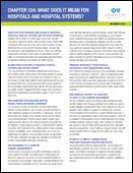

This poll – conducted in April and May 2012 by researchers at the Harvard School of Public Health – asked “sick” Massachusetts residents a series of questions related their perception of health care costs and quality in Massachusetts, the reasons for cost and quality problems, and their personal experience with cost and quality issues. The results showed that sick residents are very concerned about health care costs in Massachusetts, and some struggle with their own costs of care.


This report is the latest in a series by the Urban Institute analyzing the impact of the Massachusetts health reform law. Findings show that despite the state's economic recession Massachusetts has maintained record low levels of uninsured and access to needed health care has improved. This report is based on the 2010 Massachusetts Health Reform Survey (MHRS), which has tracked the impact of the law annually since 2006.
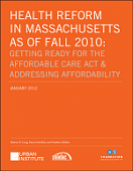

Blue Cross Blue Shield of Massachusetts Foundation report by Alan G. Raymond on the first five years of Massachusetts health reform implementation, including comprehensive assessments of how the law is working, impacts on coverage and access to care, and cost and funding.
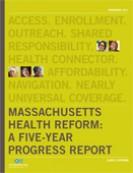

Released on the fifth anniversary of the passage of Massachusetts health reform, this comprehensive slide deck pulls together the findings of surveys and other efforts to monitor the impact of the 2006 Massachusetts health reform law. The charts in this report track the impact of Massachusetts health reform efforts on coverage and access to care, the response to the individual mandate, employer participation in providing coverage to employees, and public opinion.


This report is the latest in a series by the Urban Institute analyzing the impact of the Massachusetts health reform law. Findings show that despite the state's economic recession Massachusetts has maintained record low levels of uninsured and access to needed health care has improved. Additionally, disparities in coverage and care have been eliminated or narrowed. Solid public support for the health reform law continues. This report is based on the 2009 Massachusetts Health Reform Survey (MHRS), which has tracked the impact of the law annually since 2006.
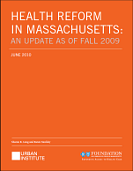

This policy brief based on data from the 2009 Massachusetts Health Reform Survey shows that women have achieved significant gains in insurance coverage and in access and use of health care since health reform was implemented in Massachusetts. The gains were particularly strong for subgroups of women who had lower levels of coverage and poorer access prior to reform, including lower-income women, women of minority race/ethnicity, and women without dependent children.
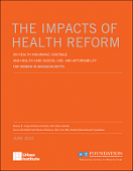

This policy brief by Sharon Long of The Urban Institute measures geographic and racial disparities in access to health care in Massachusetts. The data in the brief comes from the third annual Massachusetts Health Reform Survey. This revised version of the policy brief, which was originally published 5/28/2009, reflects changes made after an error in constructing survey weights was discovered and corrected.


An eight-page issue brief that analyzes the impacts of health reform on insurance coverage across different population groups in the state. Specifically, it examines differences in insurance coverage by demographic characteristics (e.g., age, race/ethnicity, and gender), health status, employment, and geography.
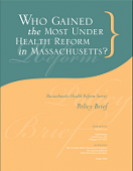

Data from the Kaiser Family Foundation/Harvard School of Public Health/Blue Cross Blue Shield of Massachusetts Foundation Massachusetts Health Reform Tracking Survey. This was the first in a series of surveys measuring Massachusetts residents attitudes towards and experiences with the 2006 health reform law.
This report by Sharon Long and Mindy Cohen provides a snapshot of Massachusetts’s adult population prior to the implementation of the 2006 health reform legislation in the state.


An examination of how to define affordability relative to the enforcement of the individual mandate requirement of the 2006 health reform law.
